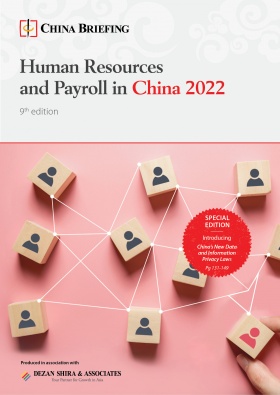China’s IIT Special Additional Deductions: An Explainer
UPDATE (August 31, 2023): On August 31, 2023, the State Council released the Notice on Raising the Standard of Special Additional Deduction for Individual Income Tax, raising the deduction standards on nursing expenses for children under 3 years old and children’s education from RMB 1,000 per month to RMB 2,000 per month, respectively, and raising the deduction standard on expenses for supporting the elderly from RMB 2,000 per month to RMB 3,000 per month. The adjustments took effect on January 1, 2023, retrospectively.
UPDATE (March 28, 2022): On March 28, 2022, the State Council released the Notice on the Establishment of Individual Income Tax Special Additional Deduction for Infants Nursing under 3 Years Old, which stipulates that the nursing expenses for children under three years old will be deducted from IIT taxable income as special additional deductions, effective from January 1, 2022. The deduction standard is RMB 1,000 per month for each child. Meanwhile, the State Taxation Administration (STA) revised the Operational Measures for Special Additional Deductions for Individual Income Tax (for Trial Implementation).
On December 21, 2018, China’s State Taxation Administration announced the “Operational Measures for Special Additional Deductions for Individual Income Tax (for Trial Implementation) ” (or “Trial Measures”). The Trial Operational Measures, which took effect on January 1, 2019, marks the first phase in a gradual reform of special additional deductions under China’s new IIT Law.
On March 28, 2022, the State Council released the Notice on the Establishment of Individual Income Tax Special Additional Deduction for Infants Nursing under 3 Years Old, which stipulates that the nursing expenses for children under three years old will be deducted from IIT taxable income as special additional deductions, effective from January 1, 2022. The deduction standard is RMB 1,000 per month for each child. Meanwhile, the STA amended the Trial Measures to accommodate the updates.
China’s IIT Special Additional Deduction
According to the Trial Measures and the newly released Notice, there are seven categories of special additional deductions that can be deducted from IIT taxable income:
- Nursing expenses for Children under 3 years old (newly added);
- Children’s education;
- Continuing education expenses;
- Healthcare costs for serious illness;
- Housing mortgage interest;
- Expenses for supporting the elderly; and
- Housing rent.
The applicable scope, deduction amount, and deduction method of each special additional deduction item are summarized below:
|
IIT Special Additional Deductions in China(updated) |
|||
| Item | Applicable scope | Deduction Amount | Deduction method |
| Nursing expenses for children under 3 years old | Nursing expenses | RMB 2,000/month for each child (or RMB 24,000/year for each child) | • Standard deduction for each kid
• 50/50 split between parents (guardian), or 100% deducted by one parent (guardian) |
|
Children’s education expenses |
• Pre-school education • Diploma education |
RMB 2,000/month for each child (or RMB 24,000/year for each child) |
• Standard deduction for each kid
• 50/50 split between parents (guardian), or 100% deducted by one parent (guardian) |
|
Continuing education expenses |
Diploma education Professional qualification |
RMB 400/month, up to 48 months (or RMB 4,800/year, up to four years)
RMB 3,600 in the year when the related certificate issued |
• Standard deduction
• Parent could choose to claim such expenses for their child if it’s for diploma education |
|
Healthcare costs for serious illness |
Expenses recorded in the social medical insurance management system |
Maximum RMB 80,000 based on actual basis |
• Deduction on actual expenses
• Can only deduct the medical cost that is over RMB 15,000 and borne by the individuals • Could claim for the spouse and the underaged children |
|
Housing loan interest |
First housing loan under taxpayer or spouse’s name |
RMB 1,000/month up to 240 months (or RMB 12,000/year, up to 20 years) |
• Standard deduction
• Could be 50/50 split between the couple, or 100% deducted by one of them. |
|
Expenses for supporting the elderly |
• Parents over 60 years old • Other legal dependent |
RMB 3,000/month (or RMB 36,000/year) |
• Standard deduction in total, regardless of the actual number of the elderly
• Could share among siblings, but each one can deduct no more than RMB 1,500/ month (or RMB 18,000/year) |
|
Housing rent |
• Taxpayer and spouse do not have a house in the city where they work |
Three applicable deduction amounts based on working locations:
• RMB 1,500/month (or RMB 18,000/year) • RMB 1,100/month (or RMB 13,200/year) • RMB 800/month (or RMB 9,600/year) |
• Standard deduction • Shall be 100% deducted by one of the couples if they live in the same city • The couple can claim this deduction separately if they live in different cities and have no house in both cities |
Notably, under the Trial Measures, the deductible for healthcare costs for serious illness can be availed by the taxpayer and their spouse or children. This new measure will provide more benefits to families.
For nursing expenses for children under 3 years old, the STA clarifies that parents (guardians) of toddlers under 3 years old are eligible for the deduction regardless of whether they are born in China or abroad. Taxpayers can enjoy the deduction from the month the baby is born until the month before the baby turns 3 years old.
Expatriates affected
The special deductions are available for both domestic and expatriate employees. In the past, all foreign employees were entitled to apply some tax-exempt allowances or fringe benefits (housing, laundry, home visit, education, etc.).
According to the latest regulation, expatriates can choose to avail of tax-exempted fringe benefits or special additional deductions before the end of 2023. However, once decided, the method cannot be changed during one calendar year.
Starting from January 1, 2024, expatriates can only enjoy special additional deductions when paying IIT in China, unless future regulations say otherwise.
How to claim special additional deductions
The Trial Measures stipulate that taxpayers who want to claim special additional deductions have to provide their personal information and keep the relevant documents as evidence for five years. In other words, taxpayers need to register via an IIT application (which requires face recognition) or physically go to the local tax bureau to complete personal registration.
However, we note that foreign taxpayers may need to physically visit the tax bureau and get the registration done in person.
Once the taxpayer has their personal account activated by the bureau, they may claim the special additional deductions through their employer or their annual tax filing (March 1 to June 30 every year).
In regards to the latter, the Trial Measures stipulated that the special additional deduction can be managed by the individual via annual tax clearance if the taxpayer does not want to share personal information with their employer. Accordingly, taxpayers can choose not to disclose personal information to a third party (such as an employer); this may help taxpayers protect their privacy, providing a degree of flexibility.
Due to the COVID-19 pandemic and other economic headwinds, Chinese authorities are tightening tax compliance management while providing more incentives to struggling businesses. Given this, taxpayers and their employers should study the relevant laws and consult with their trusted local advisers to learn more about claiming special additional deductions under the Trial Measures.
(This article was first published on January 7, 2017, and was last updated on August 31, 2023.)
About Us
China Briefing is written and produced by Dezan Shira & Associates. The practice assists foreign investors into China and has done so since 1992 through offices in Beijing, Tianjin, Dalian, Qingdao, Shanghai, Hangzhou, Ningbo, Suzhou, Guangzhou, Dongguan, Zhongshan, Shenzhen, and Hong Kong. Please contact the firm for assistance in China at china@dezshira.com.
Dezan Shira & Associates has offices in Vietnam, Indonesia, Singapore, United States, Germany, Italy, India, and Russia, in addition to our trade research facilities along the Belt & Road Initiative. We also have partner firms assisting foreign investors in The Philippines, Malaysia, Thailand, Bangladesh.
- Previous Article Shifting Attitudes and Expectations for Work in China’s Post-Pandemic Era
- Next Article China’s New Stamp Tax Law: Compliance Rules, Tax Rates, Exemptions







